| 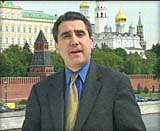 SIMON
MARKS: In Moscow this week, the hottest ticket in town
is not for Friday's state dinner at the Kremlin with President
Bush, it's for "Star Wars. " The new American blockbuster opened
here this past weekend, and is playing on every big screen in
the city. 11 years after the fall of the Soviet Union, Russian
moviegoers are much like moviegoers everywhere else, captivated
by Hollywood and the U.S. entertainment industry. But stop some
of them after the show, and you'll find that many distinguish
between U.S. fiction and their perceptions of fact. SIMON
MARKS: In Moscow this week, the hottest ticket in town
is not for Friday's state dinner at the Kremlin with President
Bush, it's for "Star Wars. " The new American blockbuster opened
here this past weekend, and is playing on every big screen in
the city. 11 years after the fall of the Soviet Union, Russian
moviegoers are much like moviegoers everywhere else, captivated
by Hollywood and the U.S. entertainment industry. But stop some
of them after the show, and you'll find that many distinguish
between U.S. fiction and their perceptions of fact.
The Russian reaction to U.S. policy
WOMAN ON STREET (Translated): There's
too much dictating going on from America. I don't like Bush. I
have serious doubts about his intellectual abilities.
MAN ON STREET (Translated): It
seems as though America is a country that likes to dictate its
will to other countries. You have to make some decisions, taking
other opinions into account. Bush is a peasant, a cowboy. Putin
is much better. He speaks better, he's more educated, or at least
that's my impression.
MAN ON STREET (Translated):
I don't like what America does. I think the Americans should
pay more attention to the opinions of other nations, the United
Nations especially.
 SIMON
MARKS: Though American music dominates the airwaves in
Russia, and this generation of Muscovites follows American fashions,
eats at American restaurants, aspires to drive American cars,
drink American sodas, and smoke American cigarettes, despite all
that, the Russian public remains, at best, ambivalent about their
country's relationship with the last remaining superpower. Polls
show that while 68 percent of Russians view America as a benevolent
country, 30 percent believe that Moscow should reassert its great
power status, and confront the U.S.A. wherever possible. SIMON
MARKS: Though American music dominates the airwaves in
Russia, and this generation of Muscovites follows American fashions,
eats at American restaurants, aspires to drive American cars,
drink American sodas, and smoke American cigarettes, despite all
that, the Russian public remains, at best, ambivalent about their
country's relationship with the last remaining superpower. Polls
show that while 68 percent of Russians view America as a benevolent
country, 30 percent believe that Moscow should reassert its great
power status, and confront the U.S.A. wherever possible.
SPOKESMAN: The president of the United States,
and the president of the Russian Federation.
SIMON MARKS: President Bush maintains the two
countries are about to open a new chapter in their post-Cold War
ties, a chapter that opens with the nuclear agreement the two
presidents will sign Friday, setting the stage for cuts of up
to two-thirds in their arsenals of deployed strategic nuclear
warheads over the next ten years.
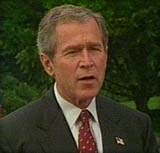 PRESIDENT
GEORGE W. BUSH: This treaty will liquidate the legacy
of the Cold War. When I sign the treaty with President Putin in
Russia, we will begin the new era of U.S.-Russian relationships,
and that's important. The new era will be a period of enhanced
mutual security, economic security, and improved relations. PRESIDENT
GEORGE W. BUSH: This treaty will liquidate the legacy
of the Cold War. When I sign the treaty with President Putin in
Russia, we will begin the new era of U.S.-Russian relationships,
and that's important. The new era will be a period of enhanced
mutual security, economic security, and improved relations.
SIMON MARKS: The U.S. and Russia have also found
a new accommodation over the eastward expansion of NATO. A new,
NATO-Russia council will give Moscow a greater level of involvement
in the decision-making processes of its former military nemesis,
an agreement that codifies the expansion of the alliance to include
many of Russia's former satellites in eastern Europe. But in Moscow,
there is by no means unanimous agreement that the latest achievements
are historic, or that a new chapter is about to begin.
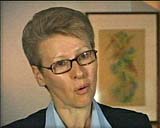 LILIA
SHEVTSOVA, Carnegie Endowment for International
Peace: Both countries are within the old pattern
of relationship. Both countries still are thinking about security
treaties, about irritants, and still are within the pattern of
the Cold War. Very strangely, ironically, the summit, which intends
to put the Cold War beyond, is the reflection, the symbol of the
Cold War relations. LILIA
SHEVTSOVA, Carnegie Endowment for International
Peace: Both countries are within the old pattern
of relationship. Both countries still are thinking about security
treaties, about irritants, and still are within the pattern of
the Cold War. Very strangely, ironically, the summit, which intends
to put the Cold War beyond, is the reflection, the symbol of the
Cold War relations.
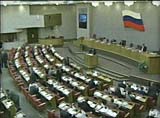 SIMON
MARKS: At the Russian parliament, the Duma, where President
Putin now controls a coalition that is expected to back the new
nuclear treaty with Washington, you can nevertheless hear a similar
viewpoint. And you can hear it from a new generation of young
reformers, like Alexei Arbatov. The deputy chairman of the Duma's
defense committee, he says the nuclear deal is better than no
deal at all, but he still worries about the dynamic of today's
U.S.-Russia relationship. SIMON
MARKS: At the Russian parliament, the Duma, where President
Putin now controls a coalition that is expected to back the new
nuclear treaty with Washington, you can nevertheless hear a similar
viewpoint. And you can hear it from a new generation of young
reformers, like Alexei Arbatov. The deputy chairman of the Duma's
defense committee, he says the nuclear deal is better than no
deal at all, but he still worries about the dynamic of today's
U.S.-Russia relationship.
ALEXEI ARBATOV, Member, Russian
Duma: It's not a relationship between equals. Certainly,
Americans are dominating, and Russians feel that they are not
getting enough in response to what Russia has been doing since
September 11.
Modernizer and authoritarian?
SIMON MARKS: What Vladimir Putin has been doing
since September 11 is securing US support by hitching his wagon
to President Bush. The Russians say they warned of the risks of
global terror even before the attacks on New York and Washington.
Where President Bush speaks of an "axis of evil ", the Russian
leader now talks of an "arc of instability. " He's provided an
unprecedented degree of intelligence to the US, as well as significant
advice on the dangers of fighting a military campaign in Afghanistan.
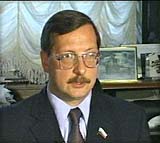 ALEXEI
ARBATOV: In a sense, it may be a new chapter, but it's
not a chapter which is liked or supported by the vast majority
of Russian public opinion, mass media, parliament, political and
strategic community. This kind of chapter of which President Putin's
policy is one part, and American policy is another part, is supported
only by a minority of Russian political and military elite. ALEXEI
ARBATOV: In a sense, it may be a new chapter, but it's
not a chapter which is liked or supported by the vast majority
of Russian public opinion, mass media, parliament, political and
strategic community. This kind of chapter of which President Putin's
policy is one part, and American policy is another part, is supported
only by a minority of Russian political and military elite.
SIMON MARKS: The ambivalence of the Russian
public to developments is mirrored by the ambiguous approach of
their leader. On the one hand, Vladimir Putin has emerged as a
modernizer, the kind of leader willing to make deals with Washington
in order to secure acceptance from the western family of developed
nations.
But on the other hand, he stands accused by his opponents by
presiding
over an authoritarian crackdown here that has weakened, not strengthened,
Russian
democracy.
 In
the breakaway region of Chechnya, for example, the Russian army
has continued its brutal military campaign, often, say campaigners,
with a blatant disregard for human rights. The president says
he's fighting a war against terror in the North Caucasus. He blames
Chechen militants for the recent bombing of a military parade
in the region of Dagestan that killed 43 and wounded dozens of
children, an event cited as evidence of the threat Russia faces. In
the breakaway region of Chechnya, for example, the Russian army
has continued its brutal military campaign, often, say campaigners,
with a blatant disregard for human rights. The president says
he's fighting a war against terror in the North Caucasus. He blames
Chechen militants for the recent bombing of a military parade
in the region of Dagestan that killed 43 and wounded dozens of
children, an event cited as evidence of the threat Russia faces.
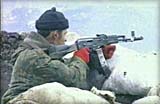 But
he's also curtailed many of Russia's open-society reforms. A whole
generation of pioneering young journalists who were reaching a
national audience just a few months ago, are now silenced after
a government offensive against the free media. Independent labor
unions, political parties, human rights organizations, and academics,
also say they're being harassed by a government intent on old-style
control, a development in which some lawmakers here say the U.S.
is now complicit. But
he's also curtailed many of Russia's open-society reforms. A whole
generation of pioneering young journalists who were reaching a
national audience just a few months ago, are now silenced after
a government offensive against the free media. Independent labor
unions, political parties, human rights organizations, and academics,
also say they're being harassed by a government intent on old-style
control, a development in which some lawmakers here say the U.S.
is now complicit.
ALEXEI ARBATOV: President Putin certainly wanted
the West to remove its sharp criticism of Russian operation in
Chechnya. So, Putin most probably counted on that. But he certainly
didn't think that the West would approve of his domestic policy,
which led to curtailment of many democratic principles and freedoms,
including the freedom of mass media. I think that American priorities
are conducive to Putin being very forthcoming and ready to make
concessions on foreign policy, while preserving the policy of
so-called "managed democracy, " which actually means curtailment
of democracy.
SIMON MARKS: Vladimir Putin still enjoys tremendous
approval here - over 65 percent in every opinion poll published.
But with two years to go before he faces reelection, criticism
of his domestic and now foreign policies is starting to grow.
Analyst Lilia Shevtsova says the president finds himself caught
between
two worlds, between the modernizers who seek an expansion of democracy,
and the
hard-liners who crave Russia's former place at the superpower
table.
LILIA SHEVTSOVA: Putin is making probably constructive
job in dismantling the superpower status of Russia, but he is
not doing it in a smart way, because he's not explaining things
to Russia. He should simply tell Russians what he intends to do
in foreign policy arena, why Russia is behaving as a minor partner
to the United States; what are the deliverables, what Russia is
getting out of its integration into the West. So far, his response
was very muted to these issues, and without national consensus,
I don't think that the partnership between Russia and the United
States will be fruitful.
 SIMON
MARKS: Playing in Moscow next week, after the Bush-Putin
summit ends, "Spiderman." And shortly thereafter, James Brown
and even Ozzy Osbourne will be paying their respects to the city.
All those shows are expected to be sold out. But that doesn't
imply that many Muscovites are losing their faith in Russia's
great power status, or their concerns that their country is increasingly
dancing to an American tune. SIMON
MARKS: Playing in Moscow next week, after the Bush-Putin
summit ends, "Spiderman." And shortly thereafter, James Brown
and even Ozzy Osbourne will be paying their respects to the city.
All those shows are expected to be sold out. But that doesn't
imply that many Muscovites are losing their faith in Russia's
great power status, or their concerns that their country is increasingly
dancing to an American tune.
See also:
Russia-US
Relations
the original at
www.pbs.org
|